By: Jewish Publication Society of America |
|---|
 Torah (JPSA) 04: Numbers
Torah (JPSA) 04: Numbers
According to Jewish tradition the 5 books of Moses are read and studied each year. In order to complete the study, the 5 books are separated into sections . The fourth book of the Pentateuch - Numbers. Presented according to weekly parshah.
Praised are You, Adonai, Our G_d, ruler of the Universe, who has made us holy with commandments and commanded us to engage in the study of Torah.
|
 Torah (JPSA) 05: Deuteronomy
Torah (JPSA) 05: Deuteronomy
According to Jewish tradition the 5 books of Moses are read and studied each year. In order to complete the study, the 5 books are separated into sections . The last book of the Pentateuch - Deuteronomy is presented according to weekly parshah.
Praised are You, Adonai, Our G_d, ruler of the Universe, who has made us holy with commandments and commanded us to engage in the study of Torah. Parshat descriptions provided by Wikipedia.
|
 Nevi'im (JPSA) 06: Joshua
Nevi'im (JPSA) 06: Joshua
The Book of Joshua is the first of the former prophets and the beginning of Nevi’im. The book of Joshua retells the conquest of Canaan and the division of the land among the Twelve Tribes. The conclusion includes Joshua’s address to the people and the witnessing of his death and burial. - Summary by Wikipedia and Linette Geisel
|
|
|
 Nevi’im (JPSA) 07: Judges
Nevi’im (JPSA) 07: Judges
The Book of Judges is the second of the former prophets within Nevi’im. The book of Judges covers the time between the conquest described in the Book of Joshua and the establishment of a kingdom in the Books of Samuel, during which Biblical judges served as temporary leaders.
Judges, tell of the struggle of the people to possess the land. When the people are unfaithful, G_d delivers them into the hands of their enemies; once the people repent, mercy is given, a Judge delivers them from oppression until the cycle repeats...
|
By: John Bunyan (1628-1688) |
|---|
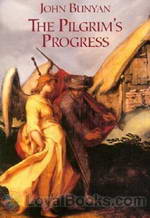 The Pilgrim's Progress
The Pilgrim's Progress
A journey that takes the hero, Christian, through the varied landscapes that constitute life and through the events that happen to human beings is the plot of The Pilgrim's Progress by John Bunyan. Readers who have read and loved Louisa May Alcott's Little Women would recall the many references to this 17th century work of religious fiction.
The Pilgrim's Progress is based on several values based in the teachings of Christianity. The importance of using the Bible as a guiding principle in life, of traveling not just geographically but also spiritually, the emphasis on community living and of the companionship of fellow people and many other themes...
|
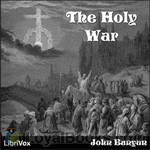 The Holy War
The Holy War
The Holy War is perhaps John Bunyan’s second most popular work, after The Pilgrim’s Progress. It tells the story of afierce battle to take control of a city from its rightful ruler.
|
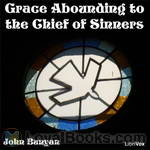 Grace Abounding to the Chief of Sinners
Grace Abounding to the Chief of Sinners
Grace Abounding is the spiritual autobiography of John Bunyan, who also penned Pilgrim’s Progress, perhaps one of the most significant pieces of Christian literature, second only to the Bible. Grace Abounding follows Bunyan’s struggle to find true repentance and forgiveness, his battle with Satan’s temptations of unbelief, his comfort found in the Bible and his overarching victory gotten by the grace of God through Jesus Christ his Son. Readers familiar with Pilgrim’s Progress will recognize...
|
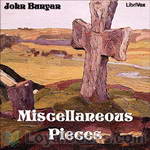 Miscellaneous Pieces
Miscellaneous Pieces
John Bunyan (November 28, 1628 – August 31, 1688), a Christian writer and preacher, was born at Harrowden (one mile south-east of Bedford), in the Parish of Elstow, England. He wrote The Pilgrim’s Progress, arguably the most famous published Christian allegory. In the Church of England he is remembered with a Lesser Festival on 30 August. Bunyan became a popular preacher as well as a prolific author, though most of his works consist of expanded sermons. In theology he was a Puritan, but there was nothing gloomy about him. The portrait his friend Robert White drew, which has often been reproduced, shows the attractiveness of his true character.
|
 The Pilgrim's Progress from this world to that which is to come
The Pilgrim's Progress from this world to that which is to come
|
 Works of John Bunyan
Works of John Bunyan
|
 The Holy war, made by King Shaddai upon Diabolus
The Holy war, made by King Shaddai upon Diabolus
|
 An Exhortation to Peace and Unity
An Exhortation to Peace and Unity
|
 The Pharisee and Publican
The Pharisee and Publican
|
 The Jerusalem Sinner Saved; or, Good News for the Vilest of Men
The Jerusalem Sinner Saved; or, Good News for the Vilest of Men
|
By: John Calvin (1509-1564) |
|---|
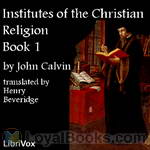 Institutes of the Christian Religion
Institutes of the Christian Religion
Institutes of the Christian Religion is John Calvin’s seminal work on Protestant systematic theology. Highly influential in the Western world and still widely read by theological students today, it was published in Latin in 1536 and in his native French in 1541, with the definitive editions appearing in 1559 (Latin) and in 1560 (French). The book was written as an introductory textbook on the Protestant faith for those with some learning already and covered a broad range of theological topics...
|
 Commentary on the Epistles of Paul the Apostle to the Corinthians, Volume 1
Commentary on the Epistles of Paul the Apostle to the Corinthians, Volume 1
John Calvin was an influential French theologian and pastor during the Protestant Reformation. Calvin's writing and preachings provided the seeds for the branch of theology that bears his name. Originally trained as a humanist lawyer, he broke from the Roman Catholic Church around 1530. After religious tensions provoked a violent uprising against Protestants in France, Calvin fled to Switzerland. Calvin developed his theology in his biblical commentaries as well as in his sermons and treatises. Calvin produced commentaries on most of the books of the Bible...
|
 Commentary on the Epistle of Paul the Apostle to the Ephesians
Commentary on the Epistle of Paul the Apostle to the Ephesians
In 1548, Calvin published his "Commentaries on six of St Paul's Epistles, viz., Corinthians, Ephesians, Philippians, Colossians and Timothy. In his "Commentaries," the peculiar doctrines which mark his system of theology occur, of course, in a scattered manner, as the occasion of his text may call them forth.
|
 Sermons upon the Epistle of Saint Paul to the Ephesians
Sermons upon the Epistle of Saint Paul to the Ephesians
While many of Calvin's sermons are now lost after they were sold by weight by the library of Geneva, his sermons on Ephesians have been preserved, having been translated into Early Modern English by Arthur Golding . Arthur Golding's claim to fame is that his translation of Ovid's Metamorphoses influenced Shakespeare.
A comparison with Calvin's commentary on the same letter shows that Calvin saw preaching as no mere explanation of the text - the sermons work consecutively through the text but circle round on the point many time with brief illustration and continuous application to the hearers...
|
 Selection of the Most Celebrated Sermons of John Calvin
Selection of the Most Celebrated Sermons of John Calvin
In offering this selection of Sermons to the publick, the publisher has not been governed by Sectarian principles, but has selected Sermons upon various subjects, that the reader may understand the general doctrine held forth by those eminent divines. When we consider the mental darkness which enveloped the world in the days of Luther and Calvin, under Popish superstition and idolatry, and that theirs were some of the first attempts to emancipate the human intellect from more than "Egyptian darkness,"...
|
 Two Godly and Learned Sermons
Two Godly and Learned Sermons
Two godly and learned sermons, made by that famous and worthy instrument in God's church, John Calvin. Which sermons were long since translated out of Latin into English, by Robert Horne late Bishop of Winchester, at what time he suffered exile from his country, for the testimony of a good conscience, as his Apology in the beginning of the book will witness. And because these sermons have long lain hidden in silence, and many godly and religious persons, have been very desirous of them: at their earnest request they are now published.
|
 Scripture Texts with Expositions and Sentence-prayers from Calvin's Commentaries on the Minor Prophets
Scripture Texts with Expositions and Sentence-prayers from Calvin's Commentaries on the Minor Prophets
The prayers of John Calvin, however, have received little attention, as compared with the fame which crowns his theological writings. His commentaries upon Jeremiah, Ezekiel, Daniel, and the minor prophets were originally delivered in the form of lectures, each followed by appropriate petitions. Both lectures and prayers were extemporaneous. In his epistle dedicatory, prefaced to the commentary upon the minor prophets, and addressed to the King of Sweden, Calvin says: "Had it been in my power I would rather have tried to prevent the wider circulation of that extemporaneous kind of teaching, intended for the particular benefit of my auditory, and with which benefit I was abundantly satisfied.
|
 Commentary on the Epistle to the Romans
Commentary on the Epistle to the Romans
Of all commentators I believe John Calvin to be the most candid...He was no trimmer and pruner of texts. He gave their meaning as far as he knew it. His honest intention was to translate the Hebrew and the Greek originals as accurately as he possibly could, and then to give the meaning which would naturally be conveyed by such Greek and Hebrew words: he laboured, in fact, to declare, not his own mind upon the Spirit's words, but the mind of the Spirit as couched in those words. Dr. King very truly says of him, "No writer ever dealt more fairly and honestly by the Word of God...
|
 Institutes Of The Christian Religion Book 1 (Allen Translation)
Institutes Of The Christian Religion Book 1 (Allen Translation)
Now, my design in this work has been to prepare and qualify students of theology for the reading of the divine word, that they may have an easy introduction to it, and be enabled to proceed in it without any obstruction. For I think I have given such a comprehensive summary, and orderly arrangement of all the branches of religion, that, with proper attention, no person will find any difficulty in determining what ought to be the principal objects of his research in the Scripture, and to what end he ought to refer any thing it contains...
|
 Sermons on Psalm 119
Sermons on Psalm 119
The reading-over of these present sermons will sufficiently declare what commodity and profit they may bring with them: As in very deed the author of them right well showeth throughout all his work, in what sort the Lord God hath heretofore been served and also how ordinarily he is served by him. And therefore, for a full recommendation as well of the author as also of the work itself, I intend through God his assistance to set forth none other thing than the same fruit and profit, which they have already gotten that have read them and that fruit which they may make report of, that shall hereafter read them...
|
By: John Donne (1572-1631) |
|---|
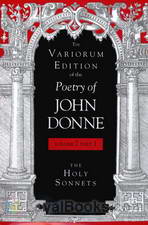 Holy Sonnets
Holy Sonnets
John Donne (1572 – March 31, 1631) was a Jacobean poet and preacher, representative of the metaphysical poets of the period. His works, notable for their realistic and sensual style, include sonnets, love poetry, religious poems, Latin translations, epigrams, elegies, songs, satires and sermons. His poetry is noted for its vibrancy of language and immediacy of metaphor, compared with that of his contemporaries. Towards the end of his life Donne wrote works that challenged death, and the fear that it inspired in many men, on the grounds of his belief that those who die are sent to Heaven to live eternally...
|
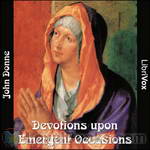 Devotions upon Emergent Occasions
Devotions upon Emergent Occasions
Devotions upon Emergent Occasions is a 1624 prose work by the English writer John Donne. It is a series of reflections that were written as Donne recovered from a serious illness, believed to be either typhus or relapsing fever. (Donne does not clearly identify the disease in his text.) The work consists of twenty-three parts describing each stage of the sickness. Each part is further divided into a Meditation, an Expostulation, and a Prayer. The seventeenth meditation is perhaps the best-known part of the work...
|
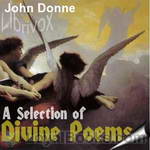 A Selection of Divine Poems
A Selection of Divine Poems
John Donne was an English Jacobean preacher, sometime lawyer, later in life a Member of Parliament and Royal Chaplain. Marrying for love against the wishes of his influential father-in-law; Donne's career was cast into shadow: forcing him to support his wife, Anne, as best he might under a specter of unforgiving penury. Despite such hardships - perhaps because of them - Donne's writings demonstrate a mastery of poetry layered with metaphysical meaning and mystery: which continues to delight and challenge modern-day readers...
|
By: John Henry Newman (1801-1890) |
|---|
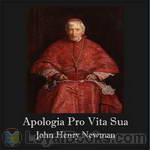 Apologia Pro Vita Sua
Apologia Pro Vita Sua
A religious autobiography of unsurpassed interest, the simple confidential tone of which "revolutionized the popular estimate of its author," establishing the strength and sincerity of the convictions which had led him into the Roman Catholic Church (Wikipedia). "No autobiography in the English language has been more read; to the nineteenth century it bears a relation not less characteristic than Boswell's 'Johnson' to the eighteenth." Rev. Wm. Barry, D.D.
|
 Apologia pro Vita Sua
Apologia pro Vita Sua
|
 Loss and Gain The Story of a Convert
Loss and Gain The Story of a Convert
|
 Parochial and Plain Sermons, Vol. VII (of 8)
Parochial and Plain Sermons, Vol. VII (of 8)
|
 Parochial and Plain Sermons, Vol. VIII (of 8)
Parochial and Plain Sermons, Vol. VIII (of 8)
|
 Dream of Gerontius
Dream of Gerontius
As a rule, when Cardinal Newman's poetry is mentioned, people think of "The Pillar of the Cloud," better known as "Lead, Kindly Light." This lyric is only one of the many beautiful poems written by an author whose fame as a writer of the finest modern prose in the English language has eclipsed his reputation as a poet. Nevertheless, he wrote a very great poem, "The Dream of Gerontius"—a poem which the intellectual world admires more and more every year, and which yields its best only after careful study and consideration...
|
 Parochial and Plain Sermons, Volume 1
Parochial and Plain Sermons, Volume 1
John Henry Newman's sermons enter the human heart easily and with transformative power. Lucid thinking, beautiful English prose, an integrated theology, insightful spiritual psychology, and a meditative biblical focus combine to make his sermons live even though many of them were written and preached almost 200 years ago. A convert to Roman Catholicism from the Anglican Church, Newman was made a Cardinal and had a wide influence on Catholic thought. More recently, his spiritual depth and personal holiness have been recognized, and in 2020 he was canonized becoming Saint John Henry Cardinal Newman. - Summary by Russell Hobbs
|
By: John Milton (1608-1674) |
|---|
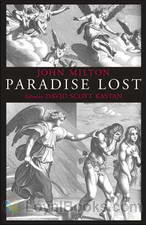 Paradise Lost
Paradise Lost
Magnificent in its scale and scope, this monumental poem by the blind poet John Milton was the first epic conceived in the English language. It describes an omniscient, all powerful God, the Fall of Man, the Temptation in the Garden of Eden, the disgraced angel who later becomes known as Satan, the Angelic Wars fought by Archangels Michael and Raphael and the Son of God who is the real hero of this saga.
The poet John Milton was more than sixty years old when he embarked on this immense work of literary creation...
|
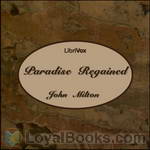 Paradise Regained
Paradise Regained
Paradise Regained is a poem by the 17th century English poet John Milton, published in 1671. It is connected by name to his earlier and more famous epic poem Paradise Lost, with which it shares similar theological themes. Based on the Gospel of Luke’s version of the Temptation of Christ, Paradise Regained is more thoughtful in writing style, and thrives upon the imagery of Jesus’ perfection in contrast to the shame of Satan.
|
 Paradise Regain'd (version 2)
Paradise Regain'd (version 2)
Having been publicly acknowledged as God's "beloved Son," Jesus retires to the desert to meditate upon what it means to be the Messiah, about whose coming many conflicting opinions have been circulating among the Jews. Although a learned rabbi, Jesus possesses no knowledge beyond what is available to all human beings. Satan also takes a new interest in this favored "son of God" and seeks to learn what threat he constitutes. The poem consists of a debate between these two adversaries, each seeking the same understanding of precisely what mankind's Savior will do in a world where the way to success typically lies through "wealth ...
|
 Torah (JPSA) 04: Numbers
Torah (JPSA) 04: Numbers
 Torah (JPSA) 05: Deuteronomy
Torah (JPSA) 05: Deuteronomy
 Nevi'im (JPSA) 06: Joshua
Nevi'im (JPSA) 06: Joshua
 Nevi’im (JPSA) 07: Judges
Nevi’im (JPSA) 07: Judges
 Uncle Rutherford's Nieces A Story for Girls
Uncle Rutherford's Nieces A Story for Girls
 Symbolism
Symbolism
 On the Indian Sect of the Jainas
On the Indian Sect of the Jainas
 Sacred Meditations
Sacred Meditations
 The Confutatio Pontificia
The Confutatio Pontificia
 A Comparative View of Religions
A Comparative View of Religions
 Chaitanya and the Vaishnava Poets
Chaitanya and the Vaishnava Poets
 Life of St. Dominic Savio
Life of St. Dominic Savio
 Twenty-Four Short Sermons On The Doctrine Of Universal Salvation
Twenty-Four Short Sermons On The Doctrine Of Universal Salvation
 An Exposition of the Last Psalme
An Exposition of the Last Psalme
 History of the English Bible
History of the English Bible
 Hymns of the Greek Church Translated with Introduction and Notes
Hymns of the Greek Church Translated with Introduction and Notes
 Hymns from the East Being Centos and Suggestions from the Office Books of the Holy Eastern Church
Hymns from the East Being Centos and Suggestions from the Office Books of the Holy Eastern Church
 Hymns of the Early Church
Hymns of the Early Church
 The Pilgrim's Progress
The Pilgrim's Progress
 The Holy War
The Holy War
 Grace Abounding to the Chief of Sinners
Grace Abounding to the Chief of Sinners
 Miscellaneous Pieces
Miscellaneous Pieces
 The Pilgrim's Progress from this world to that which is to come
The Pilgrim's Progress from this world to that which is to come
 Works of John Bunyan
Works of John Bunyan
 The Holy war, made by King Shaddai upon Diabolus
The Holy war, made by King Shaddai upon Diabolus
 An Exhortation to Peace and Unity
An Exhortation to Peace and Unity
 The Pharisee and Publican
The Pharisee and Publican
 The Jerusalem Sinner Saved; or, Good News for the Vilest of Men
The Jerusalem Sinner Saved; or, Good News for the Vilest of Men
 The Village Sunday School With brief sketches of three of its scholars
The Village Sunday School With brief sketches of three of its scholars
 Institutes of the Christian Religion
Institutes of the Christian Religion
 Commentary on the Epistles of Paul the Apostle to the Corinthians, Volume 1
Commentary on the Epistles of Paul the Apostle to the Corinthians, Volume 1
 Commentary on the Epistle of Paul the Apostle to the Ephesians
Commentary on the Epistle of Paul the Apostle to the Ephesians
 Sermons upon the Epistle of Saint Paul to the Ephesians
Sermons upon the Epistle of Saint Paul to the Ephesians
 Selection of the Most Celebrated Sermons of John Calvin
Selection of the Most Celebrated Sermons of John Calvin
 Two Godly and Learned Sermons
Two Godly and Learned Sermons
 Scripture Texts with Expositions and Sentence-prayers from Calvin's Commentaries on the Minor Prophets
Scripture Texts with Expositions and Sentence-prayers from Calvin's Commentaries on the Minor Prophets
 Commentary on the Epistle to the Romans
Commentary on the Epistle to the Romans
 Institutes Of The Christian Religion Book 1 (Allen Translation)
Institutes Of The Christian Religion Book 1 (Allen Translation)
 Sermons on Psalm 119
Sermons on Psalm 119
 Conferences of John Cassian (Part I)
Conferences of John Cassian (Part I)
 Posthumous Essays of John Churton Collins
Posthumous Essays of John Churton Collins
 The First American Sister of Charity: Elizabeth Bayley Seton
The First American Sister of Charity: Elizabeth Bayley Seton
 The Ordinance of Covenanting
The Ordinance of Covenanting
 Holy Sonnets
Holy Sonnets
 Devotions upon Emergent Occasions
Devotions upon Emergent Occasions
 A Selection of Divine Poems
A Selection of Divine Poems
 Little Gidding and its inmates in the Time of King Charles I. with an account of the Harmonies
Little Gidding and its inmates in the Time of King Charles I. with an account of the Harmonies
 Nature Mysticism
Nature Mysticism
 Christian Commonwealth
Christian Commonwealth
 Myths and myth-makers: Old Tales and Superstitions Interpreted by Comparative Mythology
Myths and myth-makers: Old Tales and Superstitions Interpreted by Comparative Mythology
 Divine Conduct, or the Mystery of Providence
Divine Conduct, or the Mystery of Providence
 Short History of the Christian Church
Short History of the Christian Church
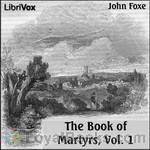 Foxe's Book of Martyrs, A History of the Lives
Foxe's Book of Martyrs, A History of the Lives
 Fox's Book of Martyrs Or A History of the Lives, Sufferings, and Triumphant Deaths of the Primitive Protestant Martyrs
Fox's Book of Martyrs Or A History of the Lives, Sufferings, and Triumphant Deaths of the Primitive Protestant Martyrs
 Hymns for Christian Devotion Especially Adapted to the Universalist Denomination
Hymns for Christian Devotion Especially Adapted to the Universalist Denomination
 Forty Years in South China The Life of Rev. John Van Nest Talmage, D.D.
Forty Years in South China The Life of Rev. John Van Nest Talmage, D.D.
 The Story of John G. Paton Or Thirty Years Among South Sea Cannibals
The Story of John G. Paton Or Thirty Years Among South Sea Cannibals
 Christianity and Liberalism
Christianity and Liberalism
 Literature and History of New Testament Times
Literature and History of New Testament Times
 Life of Rev. Henry Martyn
Life of Rev. Henry Martyn
 Heroes in Peace The 6th William Penn Lecture, May 9, 1920
Heroes in Peace The 6th William Penn Lecture, May 9, 1920
 A Statement: On the Future of This Church
A Statement: On the Future of This Church
 The Book of Religions Comprising the Views, Creeds, Sentiments, or Opinions, of All the Principal Religious Sects in the World
The Book of Religions Comprising the Views, Creeds, Sentiments, or Opinions, of All the Principal Religious Sects in the World
 A Key to the Knowledge of Church History (Ancient)
A Key to the Knowledge of Church History (Ancient)
 My Daily Meditation for the Circling Year
My Daily Meditation for the Circling Year
 Apologia Pro Vita Sua
Apologia Pro Vita Sua
 Apologia pro Vita Sua
Apologia pro Vita Sua
 Loss and Gain The Story of a Convert
Loss and Gain The Story of a Convert
 Parochial and Plain Sermons, Vol. VII (of 8)
Parochial and Plain Sermons, Vol. VII (of 8)
 Parochial and Plain Sermons, Vol. VIII (of 8)
Parochial and Plain Sermons, Vol. VIII (of 8)
 Dream of Gerontius
Dream of Gerontius
 Parochial and Plain Sermons, Volume 1
Parochial and Plain Sermons, Volume 1
 Biographia Scoticana (Scots Worthies) A Brief Historical Account of the Lives, Characters, and Memorable Transactions of the Most Eminent Scots Worthies
Biographia Scoticana (Scots Worthies) A Brief Historical Account of the Lives, Characters, and Memorable Transactions of the Most Eminent Scots Worthies
 The Apology of the Church of England
The Apology of the Church of England
 Life and Labors of Elder John Kline, the Martyr Missionary Collated from his Diary by Benjamin Funk
Life and Labors of Elder John Kline, the Martyr Missionary Collated from his Diary by Benjamin Funk
 The Works of John Knox, Vol. 1 (of 6)
The Works of John Knox, Vol. 1 (of 6)
 The Pulpit Of The Reformation, Nos. 1, 2, 3 and 4.
The Pulpit Of The Reformation, Nos. 1, 2, 3 and 4.
 The Boy and the Sunday School A Manual of Principle and Method for the Work of the Sunday School with Teen Age Boys
The Boy and the Sunday School A Manual of Principle and Method for the Work of the Sunday School with Teen Age Boys
 Two Treatises of Civil Government
Two Treatises of Civil Government
 Beacon Lights of History, Vol 1: The Old Pagan Civilizations
Beacon Lights of History, Vol 1: The Old Pagan Civilizations
 The Koran (Al-Qur'an)
The Koran (Al-Qur'an)
 The Koran (Al-Qur'an)
The Koran (Al-Qur'an)
 William Black The Apostle of Methodism in the Maritime Provinces of Canada
William Black The Apostle of Methodism in the Maritime Provinces of Canada
 Jesus of Nazareth, A Biography
Jesus of Nazareth, A Biography
 Mediaeval Hymns and Sequences
Mediaeval Hymns and Sequences
 Paradise Lost
Paradise Lost
 Paradise Regained
Paradise Regained
 Paradise Regain'd (version 2)
Paradise Regain'd (version 2)
 Messiah: Fifty Expository Discourses on the Oratorio of Handel
Messiah: Fifty Expository Discourses on the Oratorio of Handel
 Apologia
Apologia
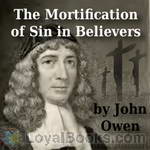 The Mortification of Sin in Believers
The Mortification of Sin in Believers
 India's Problem, Krishna or Christ
India's Problem, Krishna or Christ
 India, Its Life and Thought
India, Its Life and Thought
 Brendan's Fabulous Voyage A Lecture delivered on January 19, 1893, before the Scottish Society of Literature and Art
Brendan's Fabulous Voyage A Lecture delivered on January 19, 1893, before the Scottish Society of Literature and Art
 Sermons at Rugby
Sermons at Rugby
 'America for Americans!' The Typical American, Thanksgiving Sermon
'America for Americans!' The Typical American, Thanksgiving Sermon
 The Words of Jesus
The Words of Jesus
 The Cities of Refuge: or, The Name of Jesus A Sunday book for the young
The Cities of Refuge: or, The Name of Jesus A Sunday book for the young
 The Faithful Promiser
The Faithful Promiser
 The Mind of Jesus
The Mind of Jesus